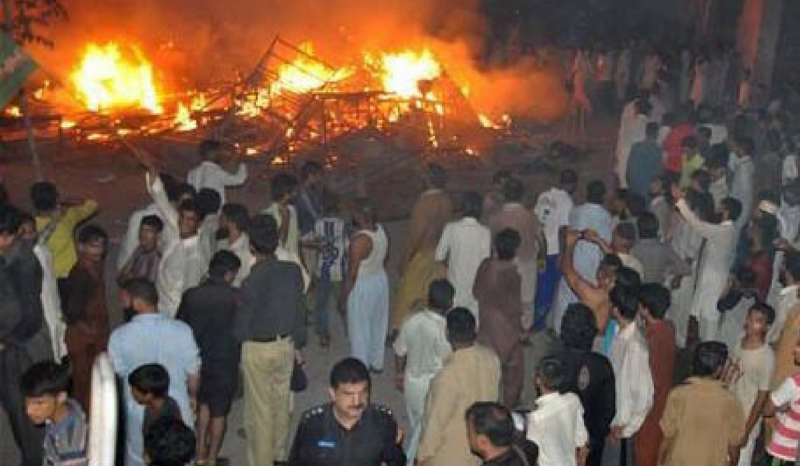
Whether it is cartoon competitions overseas, or anything remotely affiliated with the Ahmadiyya community, Pakistan has regularly expressed a collective penchant for violent threats to safeguard Islam.
This fixation of looking at everything from the perspective of religion – and that too the most radical version of Islam – self-manifested through the eventual removal of Atif Mian from the Economic Advisory Council.
Couple that with reactions to actual attempts against mocking Islam, and we extricate Pakistan’s obsession with blasphemy that often reaches genocidal proportions, where differences between deliberate attacks on the religion and internal ideological differences are never discerned.
What is even less frequent is the acceptance that neither of these should result in loud calls for mass murders, which the state inevitably also becomes party to.
Caricature of blasphemy
When Danish newspaper Jyllands-Posten published anti-Islam cartoons in February 2006, Pakistan recalled its ambassador from Copenhagen and refused to beef up security around the Danish assembly in Islamabad, in effect paving way for the 2008 bombing.
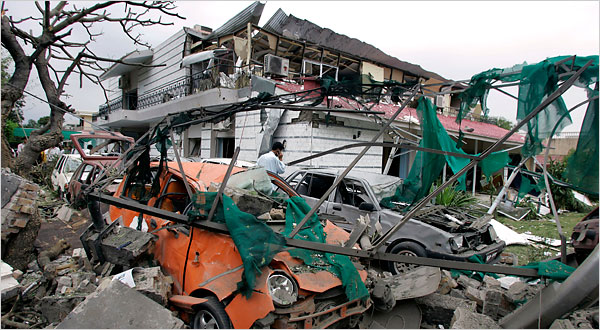
Only a week after Charlie Hebdo’s office was targeted in January 2015 for similar caricaturing, Pakistan passed a resolution against the French satirical publication who had lost nine of their journalists in the terror attack. Nationwide protests calling for mass murders were led by UN designated terrorists in Pakistan, which naturally turned violent.
Similarly, September 21, 2012 was designated as a holiday for the country as ‘Youm-e-Ishq-e-Rasool’ (Love of Prophet Day) after the film Innocence of Muslims was released. 20 people were killed, over 200 injured, as the country expressed their ‘love’ by damaging its own property and murdering its own people. Pakistan then proceeded to ban YouTube for three years.
Hence, when Dutch lawmaker Geert Wilders planned the cartoon competition, more than any other Muslim state in the world, Pakistan was under the spotlight where violent protests were once again expected.
Radical rise
Prime Minister Imran Khan had already vowed to take up the cause at the United Nations, but it was the radical Islamist Tehrik-e-Labbaik Pakistan (TLP) that posed the greatest threat to the law and order situation in Pakistan – more so than the Netherlands.
The TLP had last year besieged Islamabad over initial changes in the Electoral Reforms Bill, 2017, which the group had deemed blasphemous.
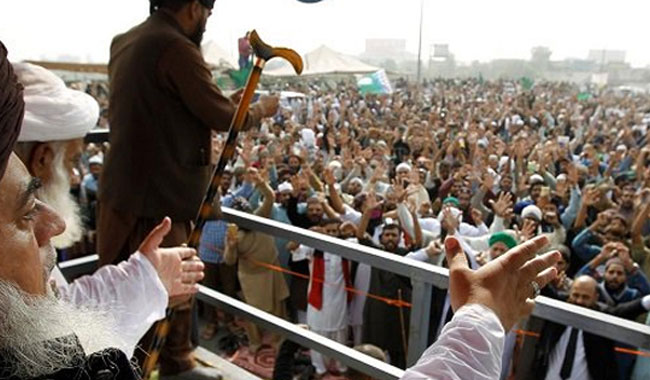
Smack in the middle of the capital, the TLP had regularly called for genocide of the Ahmadiyya community, without the state taking any action against them. TLP chief Khadim Rizvi has even called for the nuclear bomb to be dropped on the Netherlands.
Therefore, it is natural that both the Pakistani government and the TLP are claiming credit for Wilders calling off the competition citing security concerns.
State party
While the TLP taking credit goes perfectly with its calls for the mass murder of the Dutch, that the Pakistani government claimed responsibility for in effect intimidating the competition organizers, and making them fear for their lives, should be a major cause of concern for the rest of the world.
For, nowhere has the Pakistani government condemned the calls for massacres within the country – or commented on a Pakistani man being arrested in the Netherlands for plotting Wilders’ murder – or Saturday’s Amsterdam attack, which is being linked to the cartoon competition.
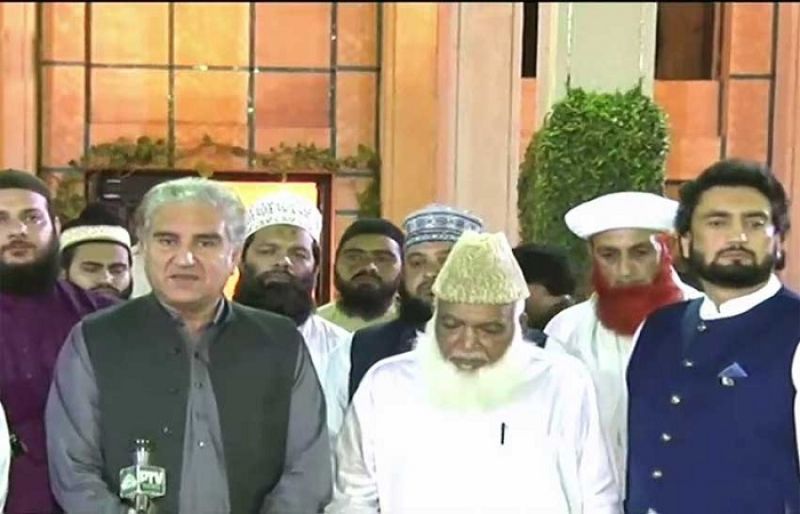
In a country where the call for murder isn’t just echoed by radical Islamists but also by banned cricketers and pop singers, it is the government’s self-interest to uphold death for blasphemy, whether by echoing calls for mass killings or by remaining silent.
Indeed the most stinging advocate of Pakistan’s genocidal obsession with blasphemy is the country’s own Constitution, making it one of 13 countries – all Muslim – that uphold capital punishment for a victimless thought crime.
Hence, implicit to Pakistan claiming ‘triumph’ over the cartoon competition being cancelled in the Netherlands is Islamabad’s desire to export its violent blasphemy law to the rest of the world.
Double standards
What can be extricated herein is Pakistan’s complete oblivion to the very concept of freedom of speech, which in its essence is safeguarding the right to offend, and not granting any religion or ideology special privileges.
These privileges are sought by orthodox Muslims despite their general failure to offer similar courtesy to other religions, or the apparent inability to discern attacks on non-believers in literalist interpretations of Islamic scriptures.
Similarly, there is a lazy assault on western ‘double standards’ over bans on Holocaust denial in western countries that uphold free speech that allows satirizing Islam.
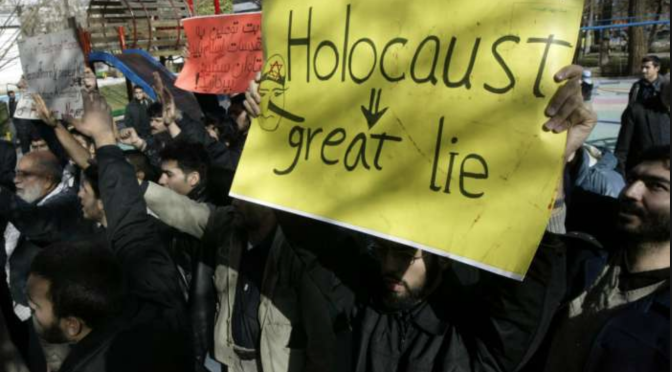
The gruesome juxtaposition of genocide and caricature notwithstanding, there are many European countries that do not have laws against Holocaust denial – including the Netherlands where it is only considered hate speech if coupled with discrimination against the Jews. There is no protection of Judaism – or any other ideology, religious or otherwise – from critique or mockery.
Individuals vs ideas
The ‘double standards’ of the West represented by the asterisks of free speech that bar discriminatory attacks on communities – including Muslims – and not ideologies, is evidently incomprehensible to Islamists. For, they uphold satire of Islam as a deadlier assault on Muslims than actual subjugation of their own community, and cite Islamic scriptures to propagate violent bigotry against other religious communities – most notably the Jews, which explains the obsession with Holocaust denial.
This is one of the reasons why no backlash has ensued against China putting a million Muslims into reeducation camps while dubbing Islam a ‘contagious disease’. Least of all in Pakistan, where China remains an ‘all-weather friend’ despite state discrimination against Muslims, while ties were to be severed with the Netherlands for a competition that the Dutch government had long distanced itself from.
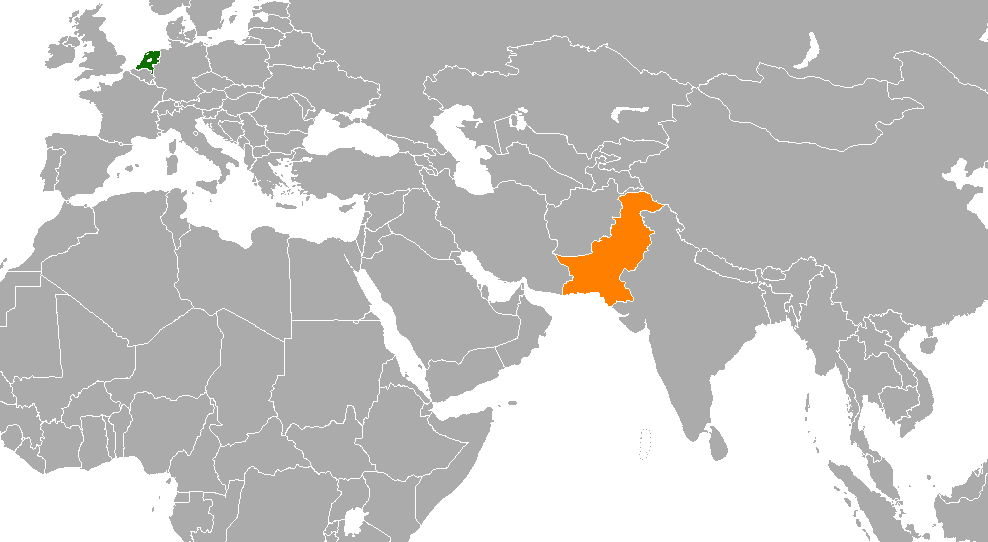
What is similarly rare is outrage over Muslim states’ violence against Muslims – whether in Syria or Yemen – at the heart of which is the Islamist notion of Muslim supremacy over all, rendering non-Muslim attacks on Muslims a graver crime, with blasphemy being the gravest of them all.
The Pakistani state not only upholds this Islamist supremacy at home through its laws, by refusing to criminalize calls for recent massacres it has clearly taken the radical position internationally as well. Meanwhile, it continues to exhibit collective failure in grasping the very concept of hate speech – which should be defined through calls for violence – that has been enshrined in the Constitution of Pakistan.
This fixation of looking at everything from the perspective of religion – and that too the most radical version of Islam – self-manifested through the eventual removal of Atif Mian from the Economic Advisory Council.
Couple that with reactions to actual attempts against mocking Islam, and we extricate Pakistan’s obsession with blasphemy that often reaches genocidal proportions, where differences between deliberate attacks on the religion and internal ideological differences are never discerned.
What is even less frequent is the acceptance that neither of these should result in loud calls for mass murders, which the state inevitably also becomes party to.
Caricature of blasphemy
When Danish newspaper Jyllands-Posten published anti-Islam cartoons in February 2006, Pakistan recalled its ambassador from Copenhagen and refused to beef up security around the Danish assembly in Islamabad, in effect paving way for the 2008 bombing.

Only a week after Charlie Hebdo’s office was targeted in January 2015 for similar caricaturing, Pakistan passed a resolution against the French satirical publication who had lost nine of their journalists in the terror attack. Nationwide protests calling for mass murders were led by UN designated terrorists in Pakistan, which naturally turned violent.
Similarly, September 21, 2012 was designated as a holiday for the country as ‘Youm-e-Ishq-e-Rasool’ (Love of Prophet Day) after the film Innocence of Muslims was released. 20 people were killed, over 200 injured, as the country expressed their ‘love’ by damaging its own property and murdering its own people. Pakistan then proceeded to ban YouTube for three years.
Hence, when Dutch lawmaker Geert Wilders planned the cartoon competition, more than any other Muslim state in the world, Pakistan was under the spotlight where violent protests were once again expected.
Radical rise
Prime Minister Imran Khan had already vowed to take up the cause at the United Nations, but it was the radical Islamist Tehrik-e-Labbaik Pakistan (TLP) that posed the greatest threat to the law and order situation in Pakistan – more so than the Netherlands.
The TLP had last year besieged Islamabad over initial changes in the Electoral Reforms Bill, 2017, which the group had deemed blasphemous.

Smack in the middle of the capital, the TLP had regularly called for genocide of the Ahmadiyya community, without the state taking any action against them. TLP chief Khadim Rizvi has even called for the nuclear bomb to be dropped on the Netherlands.
Therefore, it is natural that both the Pakistani government and the TLP are claiming credit for Wilders calling off the competition citing security concerns.
State party
While the TLP taking credit goes perfectly with its calls for the mass murder of the Dutch, that the Pakistani government claimed responsibility for in effect intimidating the competition organizers, and making them fear for their lives, should be a major cause of concern for the rest of the world.
For, nowhere has the Pakistani government condemned the calls for massacres within the country – or commented on a Pakistani man being arrested in the Netherlands for plotting Wilders’ murder – or Saturday’s Amsterdam attack, which is being linked to the cartoon competition.

In a country where the call for murder isn’t just echoed by radical Islamists but also by banned cricketers and pop singers, it is the government’s self-interest to uphold death for blasphemy, whether by echoing calls for mass killings or by remaining silent.
Indeed the most stinging advocate of Pakistan’s genocidal obsession with blasphemy is the country’s own Constitution, making it one of 13 countries – all Muslim – that uphold capital punishment for a victimless thought crime.
Hence, implicit to Pakistan claiming ‘triumph’ over the cartoon competition being cancelled in the Netherlands is Islamabad’s desire to export its violent blasphemy law to the rest of the world.
Double standards
What can be extricated herein is Pakistan’s complete oblivion to the very concept of freedom of speech, which in its essence is safeguarding the right to offend, and not granting any religion or ideology special privileges.
These privileges are sought by orthodox Muslims despite their general failure to offer similar courtesy to other religions, or the apparent inability to discern attacks on non-believers in literalist interpretations of Islamic scriptures.
Similarly, there is a lazy assault on western ‘double standards’ over bans on Holocaust denial in western countries that uphold free speech that allows satirizing Islam.

The gruesome juxtaposition of genocide and caricature notwithstanding, there are many European countries that do not have laws against Holocaust denial – including the Netherlands where it is only considered hate speech if coupled with discrimination against the Jews. There is no protection of Judaism – or any other ideology, religious or otherwise – from critique or mockery.
Individuals vs ideas
The ‘double standards’ of the West represented by the asterisks of free speech that bar discriminatory attacks on communities – including Muslims – and not ideologies, is evidently incomprehensible to Islamists. For, they uphold satire of Islam as a deadlier assault on Muslims than actual subjugation of their own community, and cite Islamic scriptures to propagate violent bigotry against other religious communities – most notably the Jews, which explains the obsession with Holocaust denial.
This is one of the reasons why no backlash has ensued against China putting a million Muslims into reeducation camps while dubbing Islam a ‘contagious disease’. Least of all in Pakistan, where China remains an ‘all-weather friend’ despite state discrimination against Muslims, while ties were to be severed with the Netherlands for a competition that the Dutch government had long distanced itself from.

What is similarly rare is outrage over Muslim states’ violence against Muslims – whether in Syria or Yemen – at the heart of which is the Islamist notion of Muslim supremacy over all, rendering non-Muslim attacks on Muslims a graver crime, with blasphemy being the gravest of them all.
The Pakistani state not only upholds this Islamist supremacy at home through its laws, by refusing to criminalize calls for recent massacres it has clearly taken the radical position internationally as well. Meanwhile, it continues to exhibit collective failure in grasping the very concept of hate speech – which should be defined through calls for violence – that has been enshrined in the Constitution of Pakistan.
